Stuttgart-based Ed. Züblin AG joins the Industry Consortium (IC) of the University of Stuttgart’s Cluster of Excellence on Integrative Computational Design and Construction for Architecture (IntCDC). This cooperation provides IntCDC with strategically important reinforcement from the German market leader in building construction and civil engineering. The corresponding memorandum of understanding was signed by both parties in June 2021.
The Deputy Spokesperson and Director for Cooperation and Knowledge Transfer in IntCDC, Prof. Dr.-Ing. Jan Knippers, is looking forward to the future cooperation: “ZÜBLIN is one of the world’s technology leaders in the construction industry and has been promoting the digitalization of construction for decades. We are therefore delighted to announce that we have been able to win ZÜBLIN as a partner for the Industry Consortium and are looking forward to an in-depth exchange on all aspects of the future of construction.”
A strong scientific partner for knowledge transfer
“At ZÜBLIN, we see the systematic integration of design and construction processes as a key to sustainable building in the future. All those involved in construction must work together much more closely in order to overcome the enormous challenges the construction sector is facing: Innovative solutions to climate neutrality and resource efficiency require interdisciplinary collaboration,” explains Dr. Ulrich Klotz, Member of the ZÜBLIN Management Board. “Against this background, we are pleased to have found in the Cluster of Excellence IntCDC a strong scientific partner in our immediate neighborhood for the development of holistic approaches to integrated design and construction. The newly sealed cooperation opens up new perspectives from which both sides will benefit substantially through regular exchange and pilot projects.”
The function of the Industry Consortium in the Cluster of Excellence
The Industry Consortium, the Cluster’s industrial advisory board, comprises several industry partners and reflects all relevant facets of the building industry. As part of the Industry Consortium, Ed. Züblin AG will actively support the Cluster at the scientific and academic level in the form of talks, webinars and joint publications. The Industry Consortium contributes to the promotion of doctoral and postdoctoral researchers by means of mentoring and consulting as well as through bi-directional research visits. This will initiate and develop professional relationships so that successful researchers may also have the opportunity to pursue a career in industry. The aim is to ensure the direct exchange of knowledge and the immediate transfer of research findings into practice, as well as to test innovative solutions on pilot construction sites.
The University of Stuttgart and Ed. Züblin AG can look back on many years of successful collaboration in various projects. First synergies in the cooperation with IntCDC developed as early as 2019, when Dr. Ulrich Klotz, Member of the ZÜBLIN Management Board, was appointed as a member of the Cluster’s Advisory Board. These synergies will now be strengthened with the appointment of ZÜBLIN to the Industry Consortium.
Ed. Züblin AG
Stuttgart-based Ed. Züblin AG has more than 13,000 employees and, with an annual output of more than € 4 billion, is one of Germany’s largest construction companies. Since it was founded in 1898, ZÜBLIN has been successfully realising challenging construction projects in Germany and abroad and today is STRABAG Group’s leading brand for building construction and civil engineering. The company’s range of services comprises all construction-related tasks – from civil engineering, bridge building and tunnelling to complex turnkey construction to construction logistics, structural timber engineering and public-private partnerships. ZÜBLIN attaches great importance to partnership-based cooperation, and our ZÜBLIN teamconcept has proved its value as a successful partnering model for more than 25 years. Current construction projects of the company, a subsidiary of globally operating STRABAG SE, include EDGE East Side Berlin, the Rinsdorf and Rälsbach viaducts on the A45 motorway, and the Boyneburg Tunnel on the A44 motorway.
The Cluster of Excellence on Integrative Computational Design and Construction for Architecture (IntCDC)
The Cluster of Excellence on Integrative Computational Design and Construction for Architecture (IntCDC) was established at the University of Stuttgart and the Max Planck Institute for Intelligent Systems in 2019. It is funded by the German Research Foundation (DFG) and involves an interdisciplinary team of approx. 120 researchers from the fields of architecture, civil engineering, manufacturing and systems engineering, computer science and robotics, social sciences and the humanities. With the central method of co-design, the Cluster is to harness the full potential of digital technologies in order to rethink design, fabrication and construction and to overcome the complex ecological, economic and socio-cultural challenges that the global built environment is facing. Based on integration and interdisciplinarity, the aim is to contribute to a sustainable built environment, high-quality and yet affordable architecture as well as a novel kind of digital building and material culture. To fulfill the research mission, IntCDC established an international network of renowned academic and industrial partners in Germany, the EU and worldwide.
Expert Contact:
Ed. Züblin AG, Birgit Kümmel, Corporate Communications, +49 221 824-2472, presse@zueblin.de
IntCDC Cluster of Excellence, University of Stuttgart, Christa Knoll, PR & Communications, christa.knoll@intcdc.uni-stuttgart.de
IntCDC Cluster of Excellence, University of Stuttgart, Michaela Mey, Collaboration & Knowledge Transfer, michaela.mey@intcdc.uni-stuttgart.de


